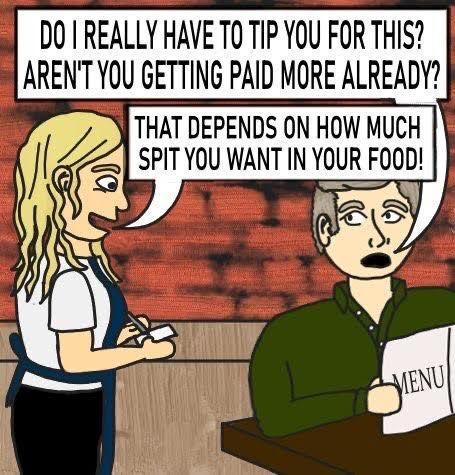
Emma Reid, Staff Cartoonist
On Dec. 28, 2021, the rule that can save tipped workers was reinstated by the Labor Department (DOL). The 80/20 rule allows tipped workers to get paid a higher minimum wage when doing tedious tasks like side work that does not involve tipping by customers. Every tipped worker needs to know about this so they can get paid the money they deserve.
When working a job like serving, the Fair Labor Standards Act allows tipped workers to be paid the low amount of $2.13 an hour, as long as that person earns enough in tips to make up the difference in the minimum wage, which is $7.25 an hour in North Carolina. This is known as a tip credit and oftentimes this is not the case, as servers are often left without tables to serve and doing work that they are not rightfully being paid for.
The 80/20 rule is here to allow those people to be rightfully compensated. The rule requires an employer to pay their workers at least the minimum wage if more than 20% of their work is non-tip generating. Tedious tasks like filling salt and pepper shakers, rolling silverware, stocking items, sweeping, cleaning and prepping for the next day are tasks a server should be getting paid more money for if they don’t have any tables to serve.
I’m sure most servers and tipped workers would agree they spend excessive time doing labor they are not getting paid for. This is where the 80/20 rule can be utilized so when workers are putting in their efforts into tasks that do not directly relate to the tips they earn, they can get paid the same amount as other workers that are tasked with doing the same things.
The 80/20 law breaks workers down into three groups so employers have a definition of who the law will apply to. The categories are “job duties that directly produce tips, job duties that directly support tip-producing work and any other job duties.” When workers fall into the third category, they are to be paid at least the minimum wage.
Workers in the second category also have an opportunity to make more money. Defining what is directly supporting tip-producing work is different for each employer, so this law helps lay it out for people. Employers are only allowed to use tip credit for workers in the second category if it “is not performed for a substantial amount of time.” The DOL has even defined a substantial amount of time as anything over 30 minutes.
Servers, this means when you do side work for longer than 30 minutes with no tables, you should be getting paid at least $7.25!
Last week, my roommate came home in rage about the fact her employer didn’t honor this law. She had no tables for two hours and was doing job duties that didn’t produce tips or support work that produces tips. According to DOL guidelines, she should have been paid at least $7.25 for that next hour and a half after her last table.
When confronted, her employer said the switch in wage only counts when your boss says you don’t have to serve any more tables, rather than when your table physically leaves. But according to the DOL, this isn’t true. Her employer took advantage of her lack of knowledge regarding this law and falsely told her that she didn’t qualify for earning money. At the time, she didn’t know the details and could not argue her case to get the money she earned and deserved.
This is precisely why it is so important for tipped workers to know about this law so they don’t get taken advantage of. I don’t doubt other employers will do the same thing they did to my roommate. This law was made to protect tipped workers, but most of my tipped-worker friends didn’t know about the law until my roommate had this issue.
Employers will most likely hide their knowledge of the law and choose to not uphold it unless someone brings it up. If you are a tipped worker right now and you didn’t know about this, your bosses are probably hiding it from you because they don’t want to pay up. Being informed and well-versed in the 80/20 law can help stop employers from exploiting their workers. Trying to hide the fact that they potentially owe all of their tipped workers more money is shady and selfish.
One-on-one confrontation about not getting paid the right amount may not be the best strategy for getting that money, like I saw for my roommate. A great way for employees to make sure their bosses aren’t capitalizing off them is to go together and take action.
Group solidarity is a powerful thing, and if all employees demand their bosses uphold the law, they are more likely to get paid what they deserve. This knowledge is also powerful when employers are not expecting their employees to demand the money they have been hiding from them.
Readers, I encourage you to share this information with anyone you know who could benefit from it, to ensure they get paid what they deserve. The restaurant industry is already very stressful and demanding, so any amount of money owed to a worker, they should get.